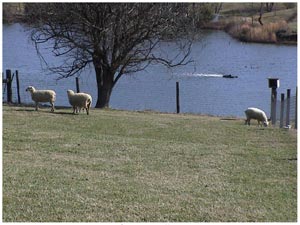Ovine Medical Information
Below is general information regarding sheep care. Please remember your veterinarian is your greatest source of information and consultation is highly recommended.
Sheep Normal Values:
Temperature 101F-104F
Pulse 60-90 beats per min.
Respiration 15-25 breaths per min.
Estrus/heat cycle 18-20 days
Gestation 142-146 days
Breeding season August through January
Adult weight ewes 150-200 lbs.
Rams 200-250 lbs.
Ovine Preventive Health Care
Lambs: It is essential that baby lambs nurse from their mother soon after birth. The ewes' colostrum is rich in nutrients and antibodies that are essential for the lamb's health. Soon after birth the umbilicus should be dipped in an iodine or chlorohexidine solution to help prevent infection. Lambs should be processed when they are a few days old. This could taildocking, castration, ear tagging and selenium injection, if necessary. By the age of 8-10 weeks all lambs should also be vaccinated with an 8-way Clostridial vaccine. They should be properly boostered according to manufacturers suggestions.
Vaccines for Ewes:
Vaccines for the Clostridial diseases (enterotoxemia, pulpy kidney, tetanus, blackleg ,bighead, redwater, edema disease, etc.) should be given to all ewes, not only to protect themselves, but also for the protection of their lambs.
These vaccines should be given about one month prior to lambing to maximize immunoglobulin production and transfer to colostrum. This vaccine should also be given to the rams. Other vaccines that may be necessary are against common abortion causing infections, respiratory infections, and GI infections of lambs.
Deworming:
Deworming against common GI parasites such as Haemonchus contortus should be done at least twice a year. It may be necessary to deworm as often as every six weeks if you have a severe parasite problem. There are many good dewormers on the market. Be sure to follow dosing instructions carefully and rotate dewormers annually so that the worms do not develop resistance to the medication. Frequent fecal analysis is the best way to determine parasite control.
Hoof Care:
Hoof care is another important aspect of preventive health care. Hooves should be trimmed at least twice a year. Again, it may be necessary to do this more often if you have problems such as foot rot in the herd. Any sheep that is limping should have her feet checked for the cause of lameness. Owners should be properly trained to perform foot trims
|

